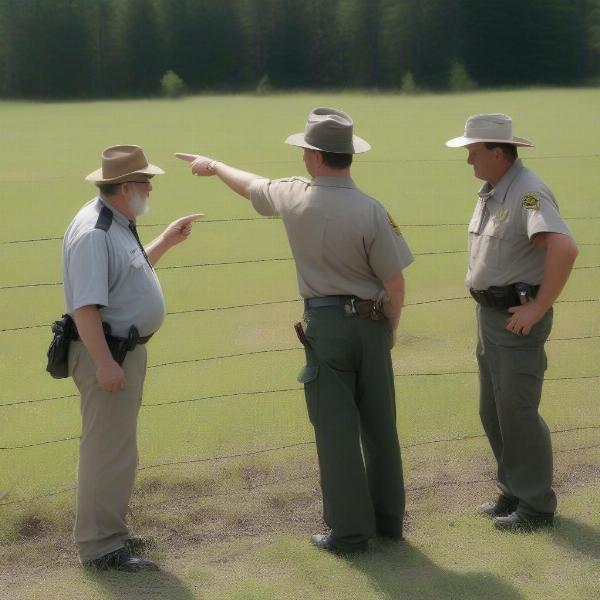Can Game Wardens Go On Private Property? This is a common question among landowners, hunters, and outdoor enthusiasts. The answer, while seemingly straightforward, is nuanced and depends on various factors, including the specific laws of the jurisdiction, the circumstances of the situation, and the nature of the property itself. Let’s explore the complexities of this issue to understand the rights and responsibilities of both game wardens and private property owners.
Understanding the Authority of Game Wardens
Game wardens, also known as conservation officers or wildlife officers, are law enforcement professionals tasked with protecting natural resources and enforcing wildlife regulations. Their authority derives from state and federal laws, which grant them specific powers to investigate potential violations, ensure compliance with hunting and fishing regulations, and protect wildlife habitats.
One crucial aspect of their authority is the power to access private land under certain circumstances. However, this power is not absolute and is subject to legal limitations designed to protect the rights of property owners. The specifics of these limitations vary by location, making it essential to understand the relevant laws in your area.
When Can Game Wardens Enter Private Property?
Generally, game wardens can enter private property without a warrant under a few key circumstances:
- Reasonable Suspicion: If a game warden has reasonable suspicion that a wildlife violation has occurred on private property, they may enter the property to investigate. This suspicion must be based on observable facts and circumstances, not mere speculation.
- Hot Pursuit: If a game warden is in hot pursuit of a suspect who has committed a wildlife violation and flees onto private property, they can generally follow the suspect onto the land.
- Consent: If the property owner grants consent, a game warden can enter private property. This consent should be freely and voluntarily given.
- Plain View Doctrine: If a game warden observes a wildlife violation in plain view from a lawful vantage point, such as a public road or adjacent property, they may enter the private property to address the violation.
- Emergencies: Game wardens may enter private property in emergency situations, such as to rescue injured wildlife or respond to a natural disaster.
Restrictions on Game Warden Access
While game wardens have certain powers, their access to private property is not unlimited. Several restrictions typically apply:
- Warrant Requirement: In most cases, if a game warden does not have reasonable suspicion, consent, or other legal justification to enter private property, they must obtain a warrant from a judge before doing so. This warrant must be based on probable cause, which is a higher standard than reasonable suspicion.
- Scope of Search: Even with a warrant or other legal justification, the scope of a game warden’s search on private property is limited to the specific purpose authorized. They cannot exceed the boundaries of the warrant or the specific circumstances that justify their entry.
- Excessive Force: Game wardens are prohibited from using excessive force when entering or searching private property. They must conduct themselves professionally and respectfully.
What to Do If a Game Warden Enters Your Property
If a game warden enters your property, remain calm and polite. You have the right to ask for their identification and the reason for their presence. You should also cooperate with their investigation, provided they are acting within the bounds of the law. However, you do not have to consent to a search of your property without a warrant or other legal justification.
 Landowner Talking to Game Warden About Property Lines
Landowner Talking to Game Warden About Property Lines
State-Specific Regulations
The laws regarding game wardens’ access to private property can vary significantly from state to state. It is crucial to research the specific laws in your area to understand your rights and responsibilities.
For example, some states have specific statutes addressing the issue of game warden access, while others rely on broader legal principles related to search and seizure. Some states may also have specific requirements regarding signage or other notifications to assert your property rights.
The Importance of Cooperation
While protecting your property rights is important, cooperating with game wardens is also essential for wildlife conservation. Game wardens play a vital role in protecting natural resources and ensuring that hunting and fishing regulations are followed. By working together, landowners and game wardens can help ensure the sustainable management of wildlife populations and the preservation of natural habitats.
FAQ
1. Can a game warden enter my property without my permission?
Yes, under certain circumstances, such as reasonable suspicion of a wildlife violation, hot pursuit, or emergencies. However, they generally need a warrant to enter private property without your permission if they don’t have a specific legal justification.
2. Do I have to answer a game warden’s questions?
You generally have the right to remain silent, but refusing to cooperate may raise suspicion.
3. Can I ask a game warden to leave my property?
You can ask them to leave, but they may have the legal authority to remain if they have a valid reason for being there.
4. What should I do if I believe a game warden has violated my rights?
Contact an attorney who specializes in property rights or constitutional law.
5. Can a game warden fly over my property?
Generally, yes, as airspace is considered public.
6. Can a game warden search my vehicle on my property?
They generally need probable cause or your consent to search your vehicle.
7. Where can I find the specific laws regarding game wardens in my state?
Consult your state’s wildlife agency website or contact a legal professional.
Knowing Your Rights and Responsibilities
Understanding the legal framework governing game warden access to private property is crucial for both landowners and outdoor enthusiasts. By knowing your rights and responsibilities, you can ensure that you are acting within the bounds of the law while also protecting your property and cooperating with wildlife conservation efforts. Remember to always consult with local authorities or legal experts for specific guidance related to your area. Can game wardens go on private property? The answer is complex, but understanding the nuances is key to responsible land ownership and wildlife management.

